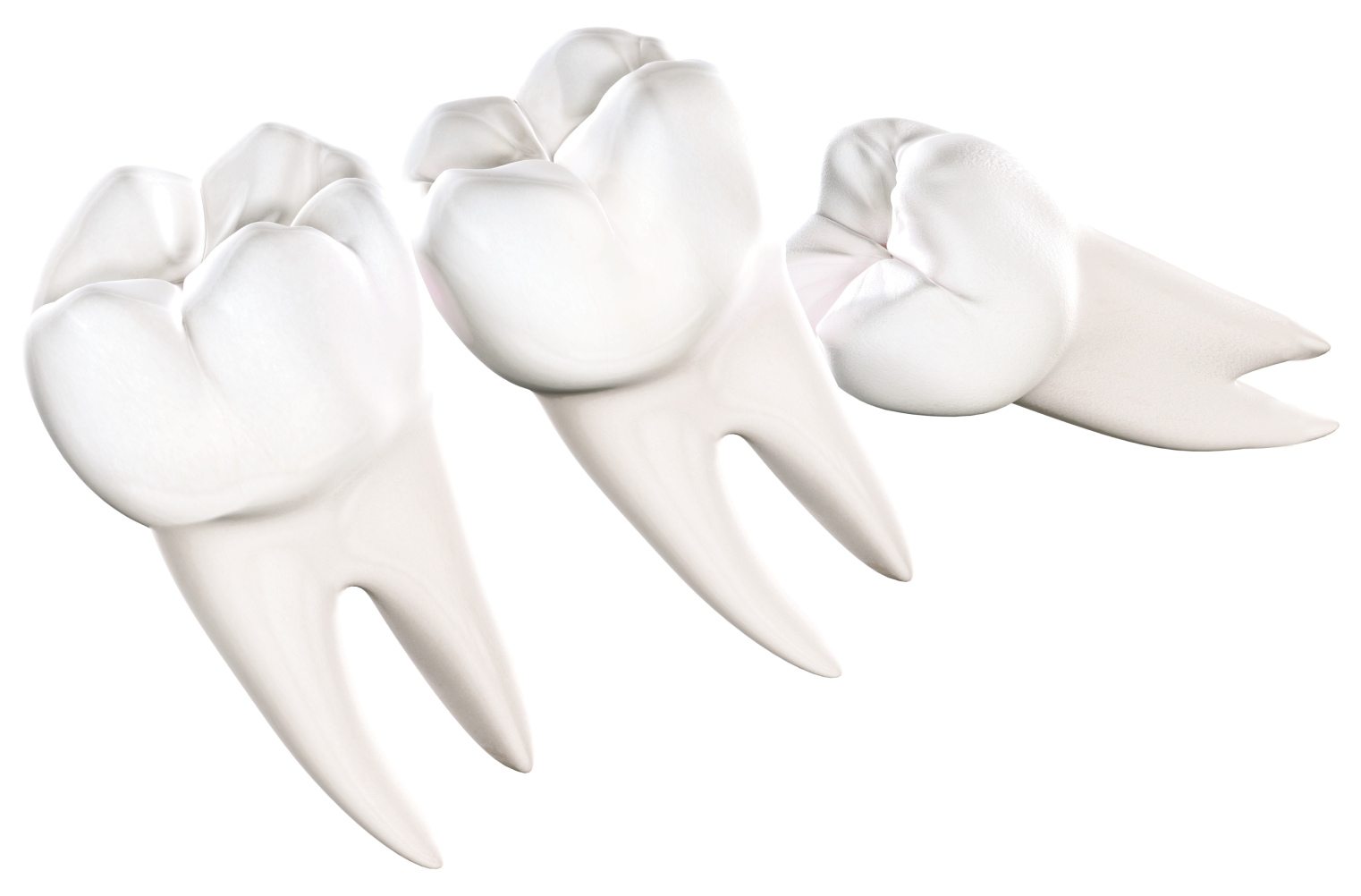Third molars, or wisdom teeth, typically erupt between the ages of 17 and 25. However, most people, especially those with small jaws, only have room for 28 adult teeth. When there is no room in the dental arch for wisdom teeth to break through the gums, they become trapped. This is known as impaction. If left untreated, impacted wisdom teeth can lead to pain, swelling, infection, overcrowding, and other complications.
Dr. Robert Lucas, Dr. Garrett Seghi, and Dr. Eric Murnan are board-certified oral and maxillofacial surgeons who perform wisdom tooth extractions for patients of all ages. By removing impacted wisdom teeth, we can help protect your oral health from a number of complications that these third molars can cause. If you or your child have wisdom teeth, contact Oral Surgery & Dental Implant Specialists of Cincinnati to schedule a consultation at our offices in Cincinnati or Mason, OH.
Types of Impaction
There are different ways a tooth can become impacted. A third molar may grow at an angle or remain upright.
- Vertical Impaction. The tooth develops upright, but still remains trapped beneath the gums.
- Horizontal Impaction. The tooth grows in a sideways position.
- Mesial impaction. The wisdom tooth is angled toward the front of the mouth.
- Distal Impaction. The tooth is angled toward the back of the mouth.
Using advanced 3D imaging technology, our oral surgeons will be able to see the exact size and location of wisdom teeth. These 3D scans allow us to diagnose oral health concerns and create detailed surgical plans to extract the wisdom teeth.
Soft Tissue Impaction and Hard Tissue Impaction
When diagnosing your impacted wisdom teeth, your oral surgeon will determine if the impaction occurs within the soft or hard tissue of the mouth.
- Soft Tissue Impaction. The tooth has erupted from the jaw bone, but has not broken through the gums.
- Partial Bony Impaction. The tooth has partially erupted through the gums, but cannot function properly. These are known as partially erupted wisdom teeth and increase the risk of developing an infection because when a tooth is only partially visible, it is difficult to keep clean.
- Complete Bony Impaction. The tooth is fully embedded in the jaw bone and has no space to erupt.
Why Remove Impacted Wisdom Teeth?
Impacted wisdom teeth can cause unwanted shifts in the positioning of your teeth and put you at risk of tooth decay, infections, and gum disease. An infected wisdom tooth can cause chronic bad breath and an unpleasant taste in the mouth, even with regular brushing. Wisdom teeth that grow sideways can put pressure on adjacent teeth, which can cause discomfort and damage your healthy molars.
In the case of asymptomatic impacted wisdom teeth, your oral surgeon may not recommend extraction. However, it is rare for a wisdom tooth to develop without causing any issues. In most cases, dentists and oral surgeons agree that having wisdom teeth removal is an effective way to protect your long-term oral health.
How Are Impacted Wisdom Teeth Removed?
Impacted wisdom teeth removal is a surgical procedure that should be performed by an oral and maxillofacial surgeon. During this procedure, your surgeon will make an incision in the gum tissue to access the impacted teeth. These molars are often broken up into smaller pieces so they can be removed. Once the molars have been removed, your surgeon will place sutures in the gums as needed.
Wisdom teeth removal is an outpatient procedure that our surgeons perform in the comfort of our offices in Cincinnati and Mason, OH. To make sure you have a comfortable and calm surgical procedure, we offer many anesthesia options and will help you select the right option before your surgery. Many patients who undergo surgery for impacted wisdom teeth receive IV sedation. This option allows you to rest in a semi-conscious state during the procedure. You will drift in and out of sleep and will not be aware of the procedure as it happens.
After undergoing surgical treatment for impacted wisdom teeth, it is important that you follow your post-operative instructions closely. These instructions will advise you on what foods to avoid, how to clean your surgical sites, and how to prevent dry socket.
Types of Anesthesia
Learn more about the types of anesthesia and sedation options available.
Impacted Wisdom Teeth Extractions in Cincinnati and Mason, OH
Our oral surgeons at Oral Surgery & Dental Implant Specialists of Cincinnati are experts in diagnosing and managing conditions pertaining to the head, mouth, and face. This includes treatment for impacted wisdom teeth, which requires specialized care from an oral surgeon. If you or your child have impacted wisdom teeth, we invite you to contact our office. We will create a custom treatment plan to manage your wisdom teeth and improve your oral health.
Hear From Our Patients
Cincinnati’s Destination for Oral Surgery Excellence
At Oral Surgery & Dental Implant Specialists of Cincinnati, we pride ourselves on delivering exceptional patient care and clinical outcomes to the greater Cincinnati area. Contact our offices in Cincinnati or Mason, OH, to schedule a consultation and see how oral surgery can improve your smile, confidence, and health.








